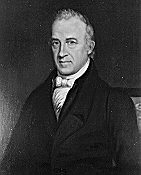Arthur Livermore
Arthur Livermore (born July 29, 1766 in Londonderry , Rockingham County , New Hampshire Colony , † July 1, 1853 in Campton , New Hampshire ) was an American politician . Between 1817 and 1821 and from 1823 to 1825 he represented the state of New Hampshire in the US House of Representatives .
Career
Arthur Livermore was the son of Samuel Livermore (1732-1803), who between 1789 and 1802 represented the state of New Hampshire in both houses of Congress . Arthur's brother Edward (1762-1832) sat between 1807 and 1811 for Massachusetts in the US House of Representatives. Arthur Livermore received his school education from his parents. After studying law and being admitted to the bar, he began working in Concord in his new profession in 1792 . A year later he moved to Chester .
Politically, Livermore was then a member of the Federalist Party . Between 1794 and 1795 he was an MP in the New Hampshire House of Representatives . He then served from 1796 to 1798 as a district attorney in Rockingham County. Between 1798 and 1809 he was an associate judge in the Superior Court of his state (now the Supreme Court ) and from 1809 to 1813 he was a presiding judge in the same court. In the presidential elections of 1800 he was elector for the federalists. In the following years Livermore moved to the Democratic Republican Party .
In the 1816 congressional elections, held nationwide, he was elected to the US House of Representatives in Washington, DC as his new party's candidate for the fifth New Hampshire MP . There he took over from Daniel Webster on March 4, 1817 . After re-election in 1818, he could remain in Congress until March 3, 1821. During this time he was chairman of the committee dealing with the Post Office and Post Roads . He was also a member of the committee that controlled the Ministry of Post's expenses. In the elections of 1820 he was defeated by Thomas Whipple . The Missouri Compromise drawn up by Henry Clay falls during this period . After that, the state of Maine was re-established. There was slavery prohibited while in the state of Missouri , who was admitted to the Union as well at this time, was allowed.
Livermore served in the New Hampshire Senate in 1821 and 1822 . From 1822 to 1823 he was a probate judge in Grafton County . During these years his Democratic Republican Party began to split into several wings, which later led to their dissolution and a reorganization of the American party landscape. Livermore joined the faction around John Quincy Adams and Henry Clay, who were in opposition to the supporters of Andrew Jackson . In the congressional elections of 1822, which were also held nationwide, Livermore was re-elected to Congress as a candidate of the Adams Clay faction for the second mandate of his state. There he took over from Nathaniel Upham on March 4, 1823 . However, since he renounced another candidacy in 1824, he could only complete one legislative period in the House of Representatives until March 3, 1825.
Between 1825 and 1832, Livermore was the presiding judge of his state's appeals court. From 1827 he lived in Campton. From 1808 to 1826 he was the curator of the Holmes Plymouth Academy . Arthur Livermore died in Campton on July 1, 1853.
Web links
- Arthur Livermore in the Biographical Directory of the United States Congress (English)
- Arthur Livermore in the database of Find a Grave (English)
| personal data | |
|---|---|
| SURNAME | Livermore, Arthur |
| BRIEF DESCRIPTION | American politician |
| DATE OF BIRTH | July 29, 1766 |
| PLACE OF BIRTH | Londonderry , New Hampshire |
| DATE OF DEATH | July 1, 1853 |
| Place of death | Campton , New Hampshire |

